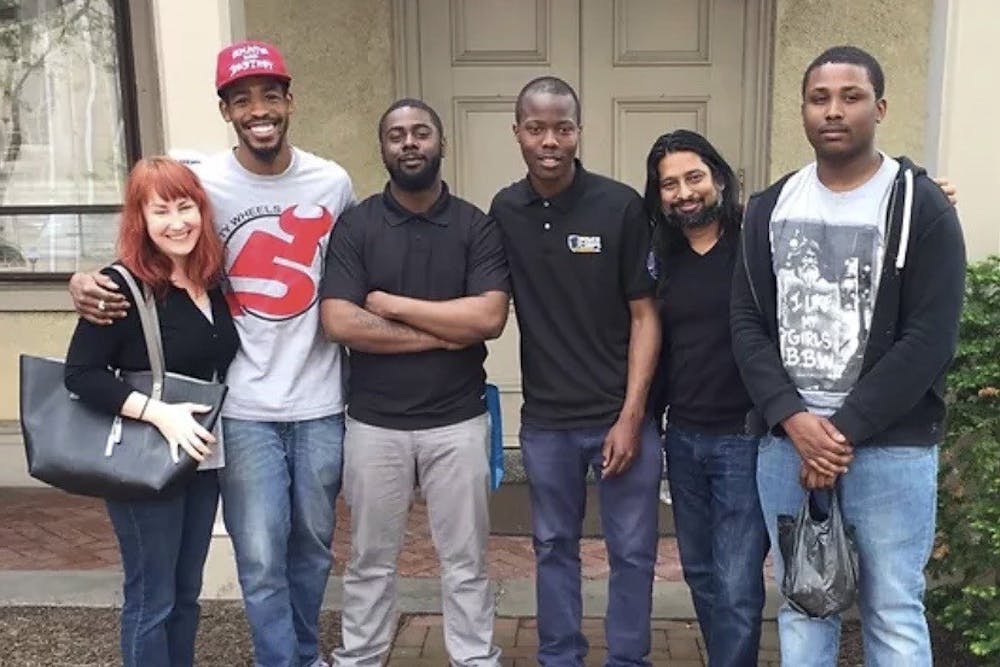Led by a Penn professor, a Philadelphia-based nonprofit that provides services for people leaving prison adjusted its outreach efforts during the pandemic to provide cell phones for former incarcerees.
The Center for Carceral Communities is an initiative of the School of Social Policy & Practice, headed by SP2 professor Toorjo Ghose, that helps formerly incarcerated people reengage with their communities in West Philadelphia. The organization provides group therapy and individual case management to formerly incarcerated people in Philadelphia, Ghose said.
When the pandemic hit the nation in March, the Center was forced to rethink how they would provide services to the increasing number of individuals released from prison, particularly from Philadelphia jails. In May, the organization received funding for a program to distribute prepaid smartphones to those who have been released, program manager Noam Keim said.
The Center has handed out over 60 phones to formerly incarcerated people in July, Keim said. When they are released from prison, incarcerated individuals receive prepaid Android smartphones from a Philadelphia Department of Prisons officer. The phones are set up with a three-month data plan and have the Zoom app installed for group meetings with staff and peers from the Center, along with the number for the Center and a recovery service hotline.
Once phones are distributed, PDP provides the names and numbers of those who received phones to the Center's peer specialist, Herb Baker.
"That's when I go to work," Baker said. He makes 20 to 30 calls a week, connecting and reconnecting with individuals released from prison. Baker provides information about the Center and the reentry services the organization offers to formerly incarcerated people, including group therapy and support services with housing, employment, education, and substance abuse treatment.
Baker said the smartphone program has been needed for a long time. While the federal Obama Phone program provides free cell phones and free minutes to low-income Americans, individuals must be on a welfare program and need proper ID. Many currently incarcerated individuals cannot meet those program requirements, which makes the Center's program a unique one, Baker said. Once the phones are distributed, there are no requirements or restrictions for its users.
“You have won half of the battle when you got your phone and you can make the calls for the jobs, for the connections, for housing, to reach out to the help that’s there” Baker said.
RELATED:
After Phila. settles COVID-19 jail conditions lawsuit, students, prof. urge aid from Penn
‘A protest movement’: How Phila. bail funds are challenging the existing cash bail system
As a former incarceree himself, Baker said he is able to connect more easily with the people he calls.
"I let them know that there are services and people that really care for them. A lot of people come out and don’t have support. I let them know that they are not alone and that I’ve been there," Baker said.
After assessing the needs of each person he calls, Baker refers them to Keim and continuously checks in on them to reassess their needs.

The phone program is part of the Center's larger effort to engage with individuals who attend the organization's weekly meetings. Ghose said that through Zoom, he meets weekly with members of the Center who are seeking support and reentry services.
The PDP commissioner and deputy commissioner worked with the Center to develop the smartphone program in order to connect the organization with the higher amount of people released from prison due to the COVID-19 pandemic, Ghose said, describing the program as "historic."
Keim hopes that this program will set a new baseline for reentry services to provide smartphones to former incarcerees.
"We are in 2020," Keim said. "People need a smartphone in order to find work and services."
Housing is the greatest issue individuals face after being released from prison, Keim and Ghose said. Formerly incarcerated people are 10 times more likely to experience homelessness than the general public, and lack of housing increases an individual's risk of contracting COVID-19.
Ghose has continually urged the University to house many of these individuals in the empty dorm rooms over the summer, as he believes housing people facing homelessness in Philadelphia is a way Penn can invest in the community during the pandemic.
"What needs to happen is that hotels in the city, as well as dorm rooms at Drexel and Penn lying empty right now, need to be requisitioned for this,” Ghose said.
The Center provides SP2 students who intern with the organization with the opportunity to engage with and learn from the community beyond the classroom, Ghose said. While the coronavirus pandemic created challenges for how staff at the Center can connect with the people they serve, its staff continues to find new ways of providing services and building community for those reentering their communities after incarceration.
"Right now, a lot of them come out and are stalled. We are trying to give them that jump start, so that way they can get on their feet and begin the process of making a life for themselves. That's the goal," Baker said.









